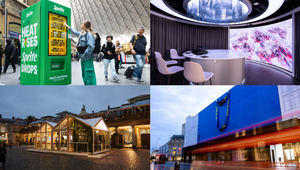
Empathy, AI and the Digital Plateau

A macro trend became apparent on day two of Web Summit 2018. We are in the midst of a digital plateau where there is real excitement around key emerging technologies – AI, AR, VR and XR - but a real lack of evidence of how they are being used to solve real problems. Magic Leap’s CEO Brenda Freeman highlighted this by stating that their product is aimed at B2B makers and that a significant amount of marketing needs to be undertaken (and a significant price drop, I imagine) before consumer uptake at scale. There are plenty of promises of what’s coming but a recognition that mass adoption is still on the horizon rather than here and now. Below are a few micro trends that I identified during my three days in Lisbon:
Empathy
Google’s Jens Riegelsberger, product design and research director, started to unpack the challenge as he talked about the need for greater empathy at the intersection of design and technology coupled with a greater focus on the user first approach. Jens also identified the need for us all to get out of our bubbles, identify the problem that needs solving and build our own conclusions from our own insight. He has found that success has come from building global specialist teams that complement each other rather than replicating the same teams around the world.
One of the driving forces behind the digital plateau is the lack of understanding of how EmTech can be harnessed to tell good stories and the prevalence of technology providing novelty rather than value. This is really underpinned by the fact that 5% of content is currently getting 90% of the attention illustrating we must focus on telling good stories as stories make us care and stories make us remember.
Mental health
Alex Tew and Michael Acton Smith from Calm talked about the massive shift in society around the awareness of and importance of mental health. They equated it to the rise of jogging in the 1970s. The early adopters are recognising the benefits while the sceptics are slowly being won-over. Health and wellness is now a $4 trillion industry and Calm built their business with the recognition that success comes from experimentation. They also recommended putting your phone on airplane mode before you go to bed and until you leave the house the next morning. I’m going to give it a go.
AI
AI definitely got the most mentions at the conference. Samsung’s VP of innovation, Luc Julia, reminded us that AI is not a thing and we should be careful what we promise in this space. The two main hurdles to progressing AI are, firstly, the limitation of natural language processing. AI recognises what is being said but the meaning of what is being said is hard to understand. We come against the same blocker, humans are average at lots of things while machines excel at very narrow tasks. AI is all about mathematics and rules and this is nothing like how the brain works. The second challenge is that quantum computing is hard to scale, Luc cited the example of the AlphaGo supercomputer with a power consumption of 300W of electricity compared to the human brain’s 30W.
The likelihood of AI taking creative jobs came up repeatedly. Wolff Olins CEO, Sairah Ashman, made an interesting observation that AI can learn creativity so in the future we will need to collaborate with AI to fuel creativity leaving time for people to focus on craft.
Dystopian futures
There were many references to data being the new oil. The internet of things is fuelling concern around privacy and security brought to life beautifully by Avast’s Vladislav Iliushin hacking into a smart home very easily through its security camera and other connected devices. Micheal Bolle, CTO and CDO of Bosch revealed that they sell 4.5 million sensors a day while drone manufacturer Kesprey’s CEO George Matthew referred to their product unlocking aerial intelligence. BMW’s Christoph Grote, SVP Electronics, talked about security and privacy being hygiene for BMW owners but that their cars will learn over time, adapting to new occasions. He revealed that BMW are focussed on building cars that are companions, more human and natural to interact with and that certain models can now change their behaviour based on the drivers emotional state.
It feels like the landscape will evolve quickly, getting us off the plateau into a steep curve of adoption and celebration of what’s possible, it just feels like the pace of change has slowed momentarily. Perhaps to let us catch up.
Damian Ferrar is SVP, ECD at Jack Morton












